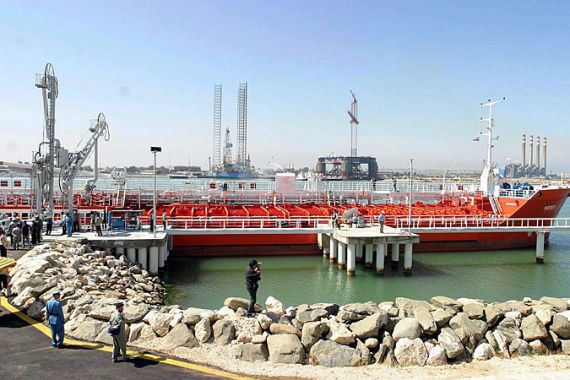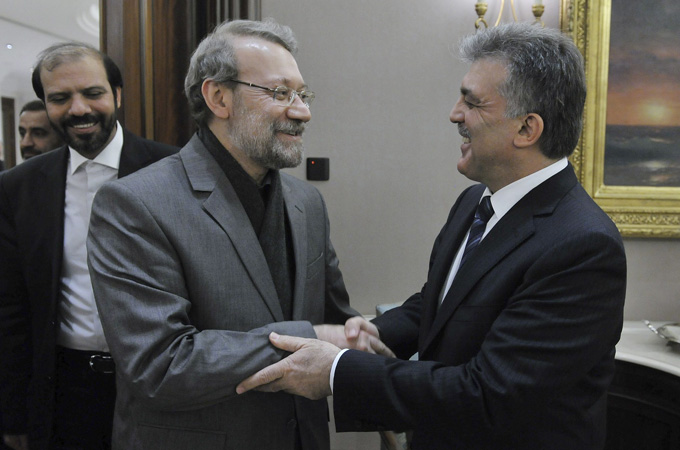Russia warns US over Iran oil sanctions
Moscow says tougher sanctions would be seen as attempt at “regime change” as Iran voices willingness to return to talks.

 |
| Turkey’s President Gul (R) shakes hands with Iran’s Parliament speaker Larijani at a meeting in Ankara [Reuters] |
Russia has warned the US that moves to tighten sanctions on Iran would be perceived as an attempt at “regime change”, as Tehran appeared to express readiness to return to negotiations and allow UN monitors to inspect its nuclear facilities.
Gannady Gatilov, Russia’s deputy foreign minister, told a press conference on Friday that additional sanctions or military strikes against Iran would “unquestionably be perceived by the international community as an attempt at changing the regime”.
Gatilov’s comments came as Washington imposed new restrictions on companies from China, Singapore and the UAE over their ties to Iranian oil.
European governments also said they were moving closer to an agreement on an oil embargo that would give companies six months to phase out contracts with Tehran.
Russia has backed four rounds of UN Security Council sanctions against its regional ally, while calling for the utmost restraint in the West’s escalating tensions with Iran.
Gatilov said new sanctions would only undermine the world community’s efforts at peacefully resolving the dispute over Iran’s nuclear ambitions.
‘IAEA inspection’
Diplomats told the AFP news agency on Friday that Iran had agreed to a high-level visit by UN nuclear inspectors, most likely in the last week of January.
The visit would probably be led by Herman Nackaerts, the International Atomic Energy Agency (IAEA) chief inspector, and could take place this month, one Western diplomat said.
Another said the trip, which comes after a November report by the IAEA raised questions over Iran’s nuclear plans, would “very likely” be in the last week of this month.
Iran’s parliamentary speaker on Thursday said he believed that the standoff could be solved through serious talks.
Larijani told a news conference, after meeting Turkish leaders in Ankara, that Tehran supported the idea of holding further talks in Turkey.
Meanwhile, the New York Times reported that the US had used a secret channel to warn Iran’s leaders against closing the strategic Strait of Hormuz, saying that doing so would provoke a US response.
Iran has threatened to close the narrow and strategic waterway, an artery for 20 per cent of the world’s oil supplies, in the event of a military strike or severe tightening of international sanctions.
The New York Times, citing unnamed US officials, said the White House had communicated to Iran’s Supreme Leader Ayatollah Ali Khamenei that closing the strait would be a “red line” and provoke a response.
The US and some of its allies have stepped up increasingly harsh sanctions on Iran over its nuclear enrichment programme, which they have charged is part of a secret drive to develop nuclear weapons.
Iran has insisted the programme is entirely peaceful and vowed to retaliate against any strike on its facilities.
Chinese firm sanctioned
The US on Thursday sanctioned China’s state-run Zhuhai Zhenrong Corp, which it said was Iran’s largest supplier of refined petroleum products.
Washington also imposed sanctions on Singapore’s Kuo Oil Pte Ltd and FAL Oil Company Ltd, an independent energy trader based in the United Arab Emirates.
The State Department said its punitive actions against the three companies was part of a broadening international effort to target Iran’s energy sector.
But Japan appeared on Friday to retreat from an earlier pledge to the US to reduce its supplies of Iranian oil.
Jun Azumi, Japan’s finance minister, said on Thursday that Tokyo wanted to “take planned and concrete steps to further reduce” its dependence on Iranian crude.
But Koichiro Gemba, the Japanese foreign minister, said on Friday that the Japanese government had come to no conclusions on the sanctions issue.
“We must look at this extremely carefully and find an intelligent solution,” he told reporters.
Gemba said over the last five years Japan had reduced its dependence on Iranian crude, which now made up around nine per cent of the country’s oil imports.
“We are examining whether there is any advantage in a further reduction. But it is important to know what impact any reduction would have on the price of crude.
Oil prices hovered above $99 a barrel in Asia on Friday, as negotiations to avert a looming strike in major oil producer Nigeria ended for the day without any result.
Crude prices have been pushed up by the US pressure on other nations to ban Iranian oil. But prices fell in late trading in New York on Thursday on word that the European Union probably would not embargo Iranian oil until the summer.